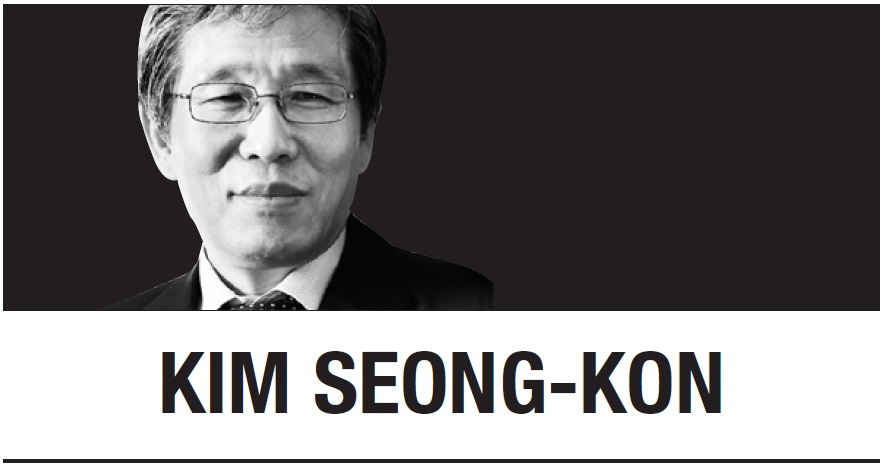 Recently, Korean universities are busy belatedly preparing for the “Age of Artificial Intelligence,” implementing new curricula and projects in academic departments and graduate schools and hiring experts in AI. It is high time, then, that we should ponder issues related to artificial intelligence with reference to our present predicament.
Recently, Korean universities are busy belatedly preparing for the “Age of Artificial Intelligence,” implementing new curricula and projects in academic departments and graduate schools and hiring experts in AI. It is high time, then, that we should ponder issues related to artificial intelligence with reference to our present predicament. “Oblivion,” a 2013 post-apocalyptic science fiction film set in 2077, well illustrates problems related to AI. In 2017, extraterrestrials invade Earth, but humanity defeated aliens. The protagonist Jack Harper, a technician called Tech-49, repairs combat drones that fight against the remaining alien scavengers. His partner is Victoria “Vika” Olson, and his mission director is Sally, who is aboard a space station called the Tet, orbiting Earth.
Jack has recurrent dreams of a mysterious woman who looks familiar to him. One day, Jack finds a spaceship crash-land on Earth. There, he sees the woman from his dreams in one of the stasis chambers. He revives the woman who reveals that she is none other than Jack’s wife, Julia. Then, Jack and Julia become prisoners of the scavengers. Aghast, Jack learns that the scavengers are not really aliens, but human survivors led by Malcolm Beech. From Malcolm, Jack learns what really happened to Earth after the war with aliens 60 years prior.
Malcolm tells Jack that extraterrestrials invaded and conquered the planet. He informs Jack that using numerous clones of Jack and formidable combat drones, extraterrestrials have been trying to wipe out all humankind on Earth. He also reveals that the Tet is an alien artificial intelligence, the function of which is to monitor and destroy human resistance with combat drones. Jack finds that aliens captured him and his co-pilot Vika and then erased their memories in order to use them as a technician and his communications partner.
When Jack encounters one of his clones that goes by Tech-52, he believes Malcolm’s story is true. Then, Jack decides to sacrifice himself for his pregnant wife Julia. He takes Julia to a peaceful lake house. Then he infiltrates into the center of the Tet with Malcolm to detonate a bomb and destroy the Tet. He and Malcolm die in the explosion.
Three years later, resistance members visit the lake house where Julia and her daughter reside. Among the visitors, Julia sees Jack, who affectionately smiles at her. Jack narrates that he has never forgotten his beloved wife Julia and the peaceful lake house. However, on his uniform is the label Tech-52, not Tech-49. It is not Jack himself, but his clone.
The ending scene of “Oblivion” touches on the fundamental issues of clones. Are the original and a clone the same or different? Obviously, Jack’s clone is the same as Jack in every sense: the same appearance, the same memory and the same mind. The only difference is the sign on their uniforms. What, then, is the difference between 49 and 52? Three years have passed since Jack’s death and 49 has become 52. Perhaps Julia can live with Jack’s clone happily ever after.
“Oblivion” also enlightens us with issues of truth and firm convictions. Initially, Jack is convinced that he is working for humans, not aliens. It never occurs to him that he is collaborating with extraterrestrials. Later, however, he realizes that he has been repairing alien combat drones that kill humans all these years. Initially, he believes the scavengers are extraterrestrials, but later becomes dumbfounded, finding out they are humans.
“Oblivion” advises us to be flexible and cast a doubt even to “absolute truth” and firm convictions. It suggests we may be wrong and unwittingly work for the wrong side. As the title of the film suggests, Jack lives in oblivion, unable to remember anything about his past, except for the flickering image of his wife. He does not even know that humanity has lost its war with the aliens.
Watching “Oblivion,” we come to realize that there is always a possibility that some powerful agency such as the Tet can wipe out our memories. Then, unwittingly we become their agents and work for them, helping them destroy our own kind. In that sense, the numerous clones of Jack may symbolize zombielike people brainwashed by political ideologies. We also realize that a Tet-like institution can spy on us and control us all the time.
Political ideologies such as Marxism or communism resemble the Tet alien artificial intelligence. Like extraterrestrials, they come from foreign places, wipe out our memories and implant tempting ideologies. While putting us under constant surveillance and censorship, they deceive us by giving us false hopes and illusions.
“Oblivion” reminds us that like Jack, we, too, may be inadvertently working for our enemies, not realizing that extraterrestrials have taken over the world already. The movie also warns that we will become one of many identical clones if we allow others to brainwash or manipulate us. To avoid it, we should be alert constantly so we do not live in oblivion.
Kim Seong-kon
Kim Seong-kon is a professor emeritus of English at Seoul National University. -- Ed.









![[Kim Seong-kon] Democracy and the future of South Korea](http://res.heraldm.com/phpwas/restmb_idxmake.php?idx=644&simg=/content/image/2024/04/16/20240416050802_0.jpg&u=)







![[KH Explains] Hyundai's full hybrid edge to pay off amid slow transition to pure EVs](http://res.heraldm.com/phpwas/restmb_idxmake.php?idx=652&simg=/content/image/2024/04/18/20240418050645_0.jpg&u=20240418181020)

![[Today’s K-pop] Zico drops snippet of collaboration with Jennie](http://res.heraldm.com/phpwas/restmb_idxmake.php?idx=642&simg=/content/image/2024/04/18/20240418050702_0.jpg&u=)